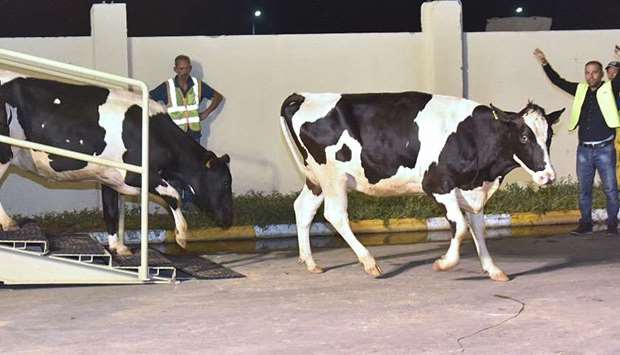It was after setting up air-conditioned pens that can house as many as 10,000 cows that the first batch of 165 was flown-in, said John Joseph Dorr, Head of the farm. The cows arrived from Germany via Hungarian capital Budapest, last night. Another batch of 130 cows will arrive in the next two weeks and by mid-August, the number will reach 4000, John Dore said.
The bovines took to their new surroundings at a farm 80km north of Doha on Wednesday despite being the centre of attention from journalists. Their arrival is being seen as one of the signs of Qatar’s defiance in the Gulf crisis.
"All the 165 Holsteins we brought in are all highly bred, especially for dairy," said John Dore. "There are 35 milking cows, that are in milk at present and there’s 130 that will calve in the next two-to-three weeks."
Dore said the livestock were the first steps in Qatar trying to become "self-sufficient in beef", and it aims to boost cattle numbers in the country from a current 5,000 to some 25,000 in the near future.
The cattle will be farmed for both milk and meat.
"Local supply covers between 10% and 15% at present" of Qatar's needs, Dore told reporters at the farm, as the cows quietly munched on grass laid down next down to the large pens in which they are housed.
Despite their journey of more than 3,700km and adjusting to new heats of 41C, the animals seemed unworried by their new surroundings, and certainly unaware of their political significance.
Moutaz al-Khayyat, chairman of Qatari firm Power International which bought and imported the cows, told Bloomberg News that once all the 4,000 cows arrive in Qatar, they will meet around 30% of the country's dairy needs.
He said it could take up to 60 flights to bring all the cattle into Qatar.
Fahad bin Mohamed al-Attiyah, Qatar’s ambassador in Moscow, compares the flying-in of cows to the Berlin airlift of 1948, when the Soviet blockade of West Berlin was broken by thousands of supply flights to Tempelhof airport.
“The point the Western world wanted to make was: we will make Berlin survive despite the siege that it faces,” he told The Sunday Telegraph. “It’s not practicality or pragmatism, it’s about ideology. If the price of Qatar’s independence is to airlift every single pint of milk then we will do so.”

